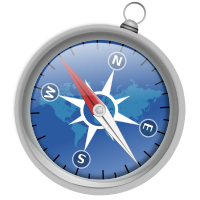What could be more emblematic of our heritage as hunter-gatherers, in our modern era, than electronic devices that hunt and gather information, that lead us to people we want to meet and places where we want to eat, shop, and play? In our article on facial recognition and biometric security (“What Happens in Vegas”, August 2014), we alluded to some concerns about involuntary exposure to visual recognition, and being tagged by face, time, and place. But if you’re willing to offer up your demographic identity and current location, you can interact with a range of mobile apps that help you participate in the world around you, on terms you define, to take advantage of opportunities you might not otherwise learn about.
 Marketing and commerce companies have turned to some educational concepts to offer customers a self-determined approach to gathering and using information, epitomized by our emerging generation of apps, which depend upon your subscription to curators of information on subjects you wish to track. In educational terms, “exposition” and “instruction”, where a curriculum is designated by a teacher, moving from generalities to specifics, is being replaced in the apps world by “guided discovery”, which starts with specifics and leads the learner toward unique insights, progressing with its conceptual partner, “exploration”, into your chosen pursuit of information and adventure.
Marketing and commerce companies have turned to some educational concepts to offer customers a self-determined approach to gathering and using information, epitomized by our emerging generation of apps, which depend upon your subscription to curators of information on subjects you wish to track. In educational terms, “exposition” and “instruction”, where a curriculum is designated by a teacher, moving from generalities to specifics, is being replaced in the apps world by “guided discovery”, which starts with specifics and leads the learner toward unique insights, progressing with its conceptual partner, “exploration”, into your chosen pursuit of information and adventure.
Curating data allows companies to perceive trends in product interest, but also the geographic realms where those trends are developing. For instance, the Japanese casual wear brand Uniglo used the commentary on social media to roll out “pop-up” stores in locations close to where they saw a greater number of potential shoppers commenting on outfits they’d tried or places they’d shopped. The goal of these retailers is to identify who is browsing a website, and from which location, allowing them to offer relevant deals to a potential customer in real-time; and they’ve discovered it’s even better to collect consumer data on cell phones because they come with a unique device identity.
Product forums like Pinterest are increasingly used to crowd source data and offer suggestions based on preferences or interests a consumer has demonstrated in the past, pushing deals and guiding them to products and retailers that might interest them. Once you’ve landed on their site, retailers depend on knowledge of their customers for product development, but especially for productive recommendations. About 35 percent of sales for Amazon depend on its recommendations, and 75 percent of sales at Netflix are directly tied to guided search or recommendation. Other retailers report that recommendations can help to increase their average purchase between 75 and 100 percent.
 Businesses are also customizing their home pages according to a customer’s profile, so the landing page for an in-coming customer will vary according to their online profile, and the list of products you’ll be shown may also have been refined to reflect past purchases or perceived interests, saving you time and effort devoted to wading through products that don’t interest you. The additional benefit to retailers will be your general impression of their store as an easy place to shop, encouraging you to recommend them to others who may not even share your tastes or style, but will still enter with the expectation of a positive experience. The stores also gain guidance for customized e-mails, which have proven to have a response rate three times greater than regular e-mails.
Businesses are also customizing their home pages according to a customer’s profile, so the landing page for an in-coming customer will vary according to their online profile, and the list of products you’ll be shown may also have been refined to reflect past purchases or perceived interests, saving you time and effort devoted to wading through products that don’t interest you. The additional benefit to retailers will be your general impression of their store as an easy place to shop, encouraging you to recommend them to others who may not even share your tastes or style, but will still enter with the expectation of a positive experience. The stores also gain guidance for customized e-mails, which have proven to have a response rate three times greater than regular e-mails.
It’s a huge give and take between retailers and customers: browse and be browsed. If you visit a site, but leave without buying, you’re likely to see an ad for that retailer next time you’re on Facebook or other social media sites. But you don’t have to wait to be noticed as part of a statistical set on social media to find what interests you. This is one great benefit of mobile apps: your ability to subscribe to the curators of information you care about. Restaurants and other businesses with loyalty programs know when you’re in the vicinity, and can alert you to storefronts in a city you’re visiting, or a special deal at a location two blocks away. And guided discovery doesn’t have to be about shopping. An app called Guardly allows you to transmit your GPS location to authorities, family and friends in an emergency. Similar features on apps like Find My Friends allow people to locate one another in real time, indoors or outside. And if you want to find your way to a place that interests you, and find your way around once you get there, apps like Mobile Mind’s Chattahoochee-Oconee National Forest are guides to discovery, too.
